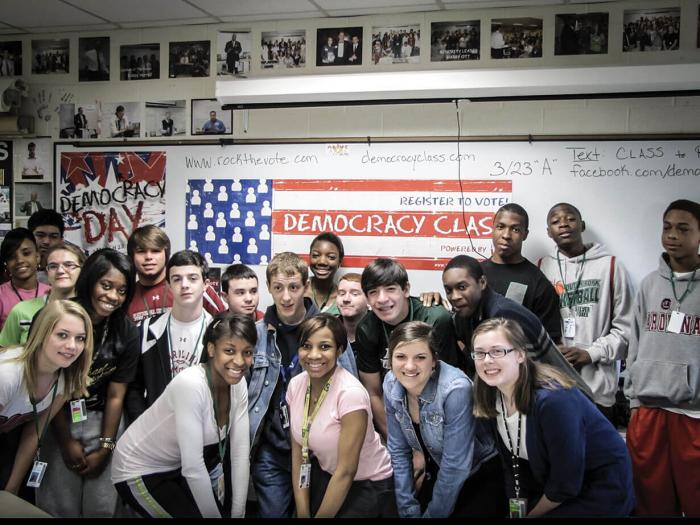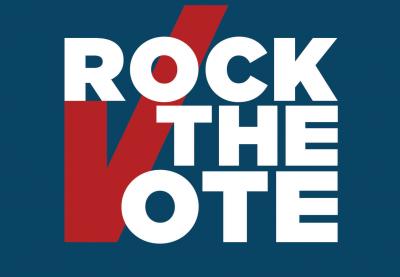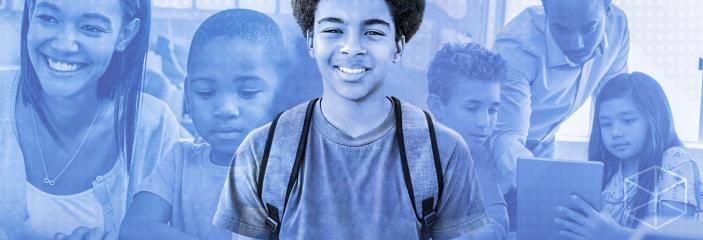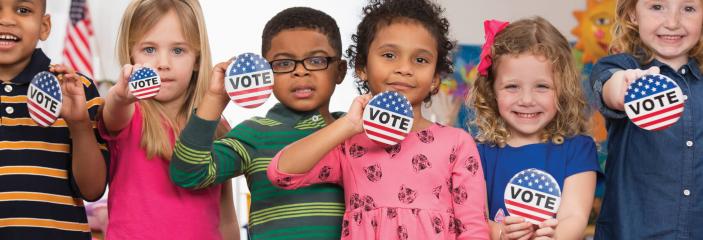Rock the Vote (RTV), a nonprofit and nonpartisan voting advocacy organization, has been getting young people registered and energized to get to the polls since 1990. On the pulse of American pop culture and music, RTV represents the interests of young voters and the realities of the 21st-century electorate. Sarah Audelo, RTV’s former political and field director (and a former educator herself!), chatted with Teaching Tolerance about what issues impassion future voters and how schools can inspire them to engage in the democratic process.
The organization clearly has great brand recognition, but what does it really mean to “Rock the Vote”?
Rocking the Vote really means that you are engaging in our country’s democracy. We, of course, do a lot of work on voter registration and turnout, and presidential years especially are huge for us. We also know that, year-round, there are elections happening all the time across our country, from the presidency all the way down to school boards, city council races and state legislator races. Rocking the Vote is really about making sure that young people are engaged all up and down the ballot, but then also beyond voting. How can we make sure that we are holding the elected accountable for the promises that they make during election? How do we make sure that we are making demands of those who are supposed to represent us? To address the issues that we care about? How do we even encourage other people to run themselves, and make sure that our communities are being fully represented in our democracy?
Tell us about Democracy Class and how it came about.
Democracy Class is a free lesson plan, really. There’s a 45-minute version [and] there’s a 90-minute version, depending on the environment that educators are operating in, that walks through the history of voting, talks about the importance of young people voting and then [offers] an opportunity for a mock election and a registration component at the end.
This came about because—if we look at the research—it’s incredibly important to make sure that these messages about civic engagement and voting are happening early and often. So many educators will partner with RTV across the country on Democracy Day, but really, throughout the year, these lesson plans [can] make sure there are these larger messages about [student] voice, their power, and registering to vote and then turning out.

Does Rock the Vote offer anything for young people under the age of 18? Why do you think people under the age of 18 should care about voting?
When it comes to those who are under 18, one of our biggest messages is “Your voice matters, too.” For those who are under 18, they are so incredibly impacted by elections because it’s the schools that they are stepping in every day, it’s the playgrounds that they are playing [o]n, it’s the summer jobs that they hope to get, it’s the curriculum [that] is or is not being taught in their schools, it’s about who is controlling the military when many of them under 18 are frequently enlisting to join, or those who are 18 enlisting to join. [T]here are so many ways that these elections absolutely impact their lives, let alone what elections mean to their parents and family and community members who might be dealing with immigration or other battles that are happening in the country right now.
I think the thing to remember is that there are certainly many things that young people can do. They can register voters. For those that are able to drive, they can drive folks to the polls. They can also make sure that their family members and their friends and their community members are participating on election day. We’ve seen really great instances of young people who are going to town halls and going to rallies and asking questions directly at candidates: What are they going to [do] for themselves or family or friends or community?
What do you think are the biggest issues concerning young people today?
Education and the economy, and they tend to be battling out for number one and number two. We know a lot of young people understand the importance of higher education, but they also know how incredibly expensive college has gotten and the high student debt loads that they are forced to take out in order to complete their education. We also know that the millennial generation was hit hardest by the recession, and it’s still trying to flip-flop out of that. We have much higher rates of poverty for young people now than previous generations the same age; we have stagnant wages; we’re still fighting for equal pay; the cost of child care is staggering and really hitting families hard.
I think if we also look at what’s happening in social justice [and movement] spaces, we see people leading on issues like immigration, police brutality, reforming the criminal justice system, but also on climate change. And young people have been leading on driving the conversations that have really shifted how people running for president are talking about many issues.
What have you learned from the Rock the Vote/USA Today Millennial Survey?*
What we do know from our last poll that came out is, not only in January were 60 percent of the generation following and planning on engaging [in the 2016 election], we are up to about 75 percent right now. We anticipate that number just going higher and higher the closer that we get to November. Young people are engaged.
Voting is the way to impact the issues that they care about. About 75 percent, three-fourths of the generation, absolutely agree with that statement.
For us, there are opportunities for those who are running for office to engage with young people and make sure they are talking about the issues they care about. We obviously know a lot of folks tend to go to college campuses, but we know there’s a lot of young people who are not on college campuses, either because they never went or they finished, and so we need to make sure there’s a much rounder message, frame and strategy when it comes to trying to reach young people and talk about the issues that they care about.
As a former educator, what are some of the most valuable things adults in schools can do to promote voting with their students?
It’s really exciting when we have communities where 16-year-olds are able to vote in local elections; making sure that we’re registering our students is really important. I love when there are community service requirements, really getting students out in the community to interact with folks. [Students] registering people to vote is a really awesome tool, and then making sure that our school districts look at other models that promote student poll workers, because when we have poll workers, they have conversations about registration, voting and turnout, [and] that’s just better for our democracy overall.
How can educators help combat barriers to voting?
When it comes to engaging young people, it can’t just happen in a voting silo. Some of the most important work that we’ve seen when it comes to young people registering and turning out is some local organization doing amazing work year-round on issues that may include voting and voting rights advocacy, but also branch out to other issue areas, whether it’s higher education, climate change, the economy or reproductive rights. It’s really important to make sure that, when we talk about engaging young people—and especially young communities of color and communities that are in high need—we’re not just dropping in for an election cycle, but that we’re really trying to build up a year-round infrastructure of engagement.
What can educators and students do for Rock the Vote? How can they get involved?
They can go to rockthevote.com and pledge to RTV. If they haven’t registered and they’re able to, we’d love for them to come on over and register on our site. And once they pledge to RTV, we can be sure to send them opportunities to volunteer when they’re in their communities. If they’re interested in hosting their own registration drives or partnering with local organizations in their community to work with, we can help them figure that out.
*Findings from an Ipsos poll conducted January 4-7, 2016, on behalf of USA Today. For the survey, a sample of 1,141 adults age 18-34 from the continental U.S., Alaska and Hawaii were interviewed online in English.


